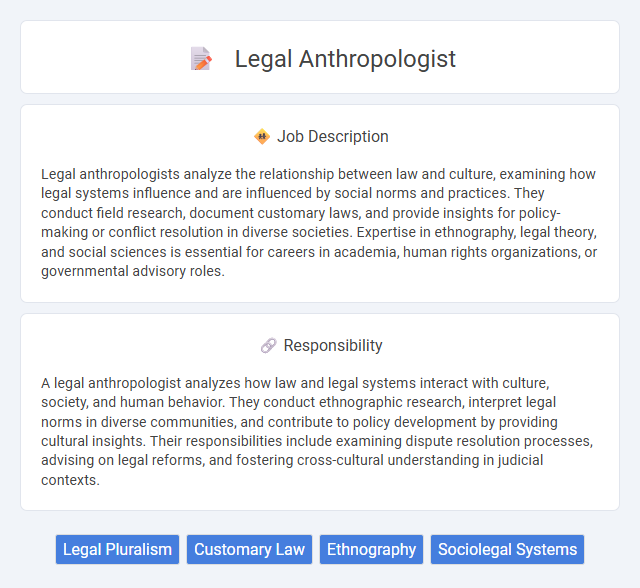
Legal anthropologists analyze the relationship between law and culture, examining how legal systems influence and are influenced by social norms and practices. They conduct field research, document customary laws, and provide insights for policy-making or conflict resolution in diverse societies. Expertise in ethnography, legal theory, and social sciences is essential for careers in academia, human rights organizations, or governmental advisory roles.
Individuals with a strong interest in cultural diversity, social justice, and legal systems are likely suitable for a legal anthropologist role. Those who possess analytical skills, patience, and an ability to navigate complex societal contexts may find this career fulfilling. People uncomfortable with interdisciplinary research or fieldwork might face challenges in this profession.
Qualification
Legal anthropologists typically require a master's or doctoral degree in anthropology, law, or a related social science field, with specialized coursework in legal systems and cultural practices. Proficiency in qualitative research methods, ethnographic fieldwork, and cross-cultural analysis is essential for examining how laws impact diverse communities. Strong analytical skills and familiarity with legal terminology and frameworks enhance their ability to provide insights into the social implications of legal processes.
Responsibility
A legal anthropologist analyzes how law and legal systems interact with culture, society, and human behavior. They conduct ethnographic research, interpret legal norms in diverse communities, and contribute to policy development by providing cultural insights. Their responsibilities include examining dispute resolution processes, advising on legal reforms, and fostering cross-cultural understanding in judicial contexts.
Benefit
A legal anthropologist role likely offers the benefit of deepening understanding of how law interacts with culture and society, which can enhance policy development and legal reform. There may be opportunities to contribute to resolving conflicts rooted in cultural differences by applying ethnographic research methods. This job might also provide a unique perspective for multidisciplinary teams working on justice and human rights initiatives.
Challenge
A legal anthropologist likely faces the challenge of interpreting complex cultural practices within diverse legal systems, which may lead to difficulties in balancing subjective cultural norms with objective legal standards. The probability of encountering conflicting values between indigenous traditions and formal law could complicate research and policy recommendations. Navigating these tensions requires nuanced analysis and adaptive methodologies to ensure both cultural sensitivity and legal clarity.
Career Advancement
Legal anthropologists advance their careers by gaining expertise in cross-cultural legal systems and participating in academic research or policy development. They can progress to roles such as senior researchers, university professors, or consultants for governmental and international agencies. Publishing influential studies and networking within interdisciplinary fields significantly boosts career growth in this specialized anthropological domain.
Key Terms
Legal Pluralism
Legal anthropologists specializing in legal pluralism analyze how multiple legal systems coexist within a single social field, including customary, religious, and state laws. Their work involves ethnographic research to understand how communities negotiate conflicts and legitimize authority across overlapping legal frameworks. This specialization provides critical insights into governance, human rights, and dispute resolution in multicultural and postcolonial societies.
Customary Law
Legal anthropologists specializing in Customary Law analyze indigenous and traditional legal systems to understand how communities govern social behavior and resolve conflicts. Their work involves ethnographic research, examining cultural norms, rituals, and oral histories that shape legal practices outside formal state law. Expertise in customary legal frameworks supports policy development, human rights advocacy, and conflict resolution in multicultural and post-colonial contexts.
Ethnography
Legal anthropologists specializing in ethnography conduct in-depth fieldwork to explore how different cultures understand and practice law, uncovering the social norms and conflict resolution methods embedded in various societies. They systematically document legal pluralism and the lived realities of justice, providing nuanced insights into informal and formal legal systems. Their research informs policy development, dispute mediation, and cross-cultural legal understanding by capturing the dynamic interplay between culture, law, and society.
Sociolegal Systems
Legal anthropologists specializing in sociolegal systems analyze how laws and legal institutions are shaped by cultural, social, and political factors within communities. They conduct ethnographic research to understand the interaction between formal legal frameworks and informal social norms, providing critical insights for policy development and conflict resolution. Expertise in sociolegal systems enables these professionals to address complex issues such as human rights, governance, and legal pluralism across diverse societies.
 kuljobs.com
kuljobs.com